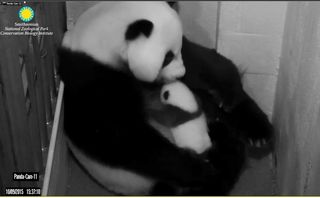Parenting
Panda Mom Taming the Tiger Mom
Avoiding Asian shame is central to positive "panda parenting" strategies.
Posted August 6, 2019

Move over Tiger Mom, a new type of parenting has emerged: Panda Parenting. Centuries of brow-beating, punishment (instead of praise), and shaming of Asian children to succeed with no recognition of the impact on a child's emotional well-being has led to a backlash.
Educator and author Esther Wojcicki has released a book this year, How to Raise Successful People: Simple Lessons for Radical Results, that is capturing headlines and the imagination of a new wave of Asian parents who believe this new method of parenting may be better than the stereotypical Tiger parenting they endured growing up.
Wojcicki, who has taught high school in Silicon Valley, believes her method of raising children gives them the tools needed to be successful as an adult. Wojcicki notes the secret is having parents inculcate a few principles to their children, summed up in the acronym of "TRICK" which stands for trust, respect, independence, collaboration, and kindness.
Some of her takeaways include talking to children as if they're adults (with trust and respect), allowing teenagers to pick projects that relate to the real world and their own passions, and letting them figure out how to complete them (independence). Unlike Tiger Parents, where the parent knows best, this type of parenting has been given the nickname of Panda Parenting, where parents let the child lead with the parents acting more as guides.
While it's plausible that some Asian-American parents will be able to parent this way, it will take tremendous individual and collective effort for the trend to grow, because principles of autonomy, egalitarianism, and independence are counter-cultural to the way generations of Asians have been raised, valuing principles of collectivism, dependency, and hierarchy.
As a psychotherapist, speaker, and workshop leader on cultural issues, I know that Tiger Parenting is not isolated to Asians. In a more general view, Tiger Parenting is known as an authoritarian style of parenting where children are demanded to blindly submit to authority.
Here are examples of how authoritarian parenting plays out in real life:
- When I ask my child to do something, and he asks why, I say something like "because I said so" or "because I want you to do it."
- I punish my child by withholding expressions of affection.
- I explode in anger towards my child.
- I yell, shout, or hit when my child misbehaves or performs poorly.
Panda Parenting falls under the category of authoritative parenting where parents still strive and aspire for their children to succeed, but success is a reflection of what children want and not what parents desire. Examples of how authoritative parenting looks include the following:
- I talk to my kids about our plans and I listen to what my children have to say.
- I try to help and comfort my child when he is upset.
- My child feels like she can come to me when she has a problem.
Once again, for Asian parents to integrate this level of parenting often means confronting the lack of emotional nurturing in their own lives. It also means having the insight to realize how entrenched Asian shame and the need to honor our lineage and ancestors come into play.
Another pivotal point involves a new generation of parents grappling with how they've defined success and whether that definition applies to their children.
Success even in progressive Asian or Asian-American households is still too often associated with high status degrees, careers, and accomplishments, with nary a thought toward growth, self-discovery, emotional well-being, and fulfillment. If Panda Parenting can accomplish this, I'm all for it, but if the goal is still for a child to fit a parent's expectations, then I'm afraid we've created another generation of children who are at risk of being emotionally traumatized.


